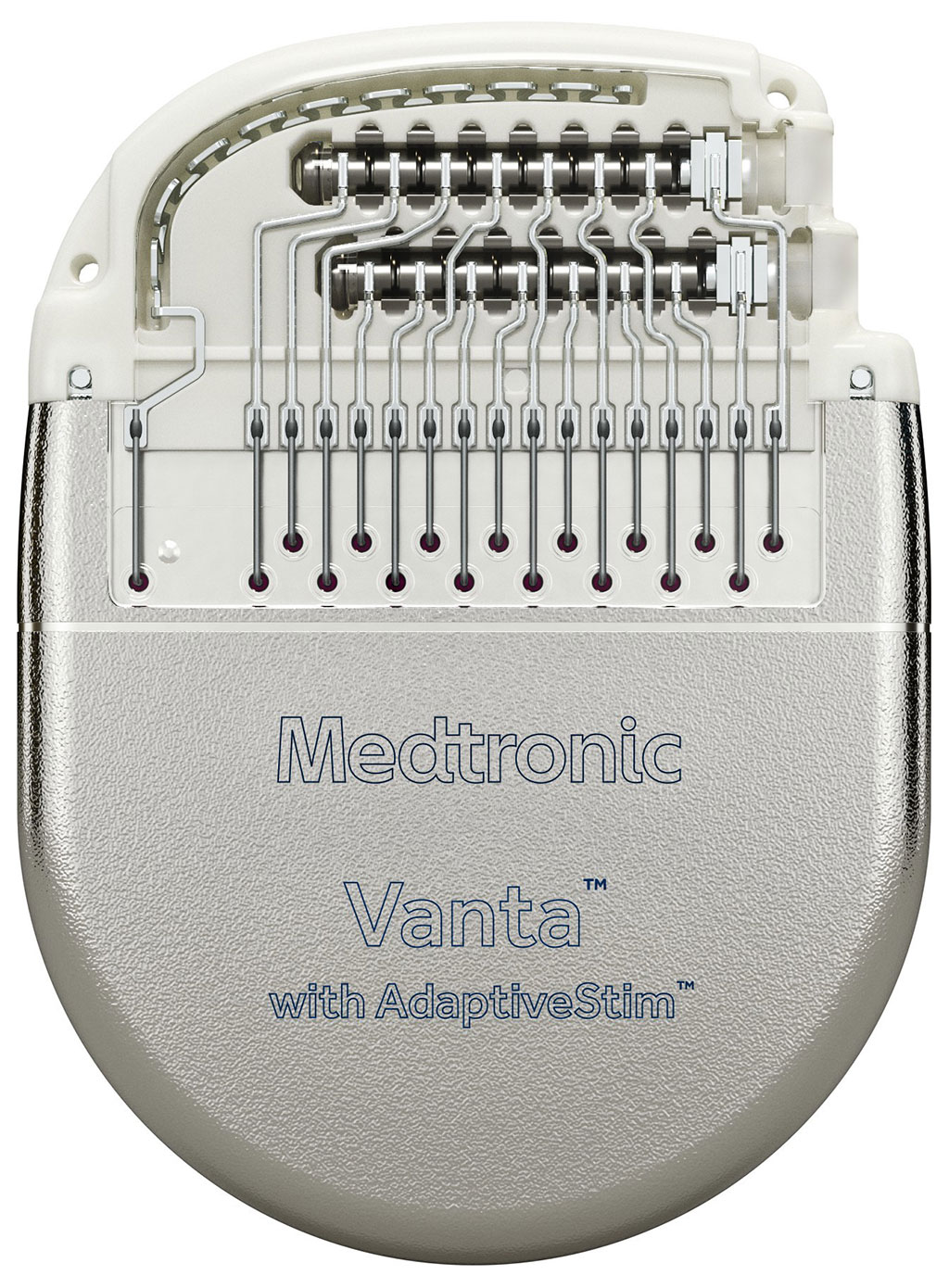Next Generation SCS Personalizes Pain Relief 
|
By HospiMedica International staff writers Posted on 24 Jun 2021 |

Image: The Vanta SCS implantable neurostimulator (Photo courtesy of Medtronic)
A new high performance spinal cord stimulation (SCS) implantable neurostimulator (INS) offers up to 11 years of battery life.
The Medtronic (Dublin, Ireland) Vanta INS offers personalized pain relief that adapts to the patient's movement or body position using a built-in accelerometer that delivers the right therapy dose to the right location, even as the pain target shifts according to body position. Called AdaptiveStim, the technology can also automatically adjust stimulation to provide each patient's optimal dose. In addition, Snapshot reporting (Medtronic's proprietary data insights solution), offers clinicians objective reporting of patient activity levels to empower objective health conversations.
Vanta INS uses SureScan magnetic resonance imaging (MRI) technology for diagnostic imaging and simple eligibility determination, which allows MRI scans to be performed anywhere on the body. In addition, for first time users, a mobile application and web portal (CareGuidePro) serves as a virtual guide for patients throughout their Medtronic SCS therapy journey. A unique feature of the system is the recharge-free battery, which offers nearly twice the device life than competitive primary cell devices.
“We are committed to delivering innovative solutions that meet the needs of every patient,” said Charlie Covert, vice president and general manager of Pain Therapies at Medtronic. “For those who prefer or require a recharge-free device, I believe the Vanta neurostimulator offers the best hardware and features available today. We are pleased to offer this solution, which is now part of the strongest and broadest overall portfolio in this market.”
“Not every patient with chronic, intractable pain is an ideal candidate for a rechargeable device, so the Vanta INS represents a welcome addition to my portfolio of available treatment options,” commented interventional pain management physician Krishnan Chakravarthy, MD, PhD. “The extended battery life, broad MRI compatibility, and personalized relief through AdaptiveStim technology allow for a more hassle-free experience and greater freedom for my patients as we manage their chronic pain.”
SCS generates electrical pulses that mask or interrupt pain signals as they travel to the brain, reducing pain sensation. Traditionally, SCS uses equally spaced electrical pulses to replace pain with a tingling sensation similar to paresthesia. SCS is used mostly in the treatment of failed back surgery syndrome, complex regional pain syndrome, and refractory pain due to ischemia.
Related Links:
Medtronic
The Medtronic (Dublin, Ireland) Vanta INS offers personalized pain relief that adapts to the patient's movement or body position using a built-in accelerometer that delivers the right therapy dose to the right location, even as the pain target shifts according to body position. Called AdaptiveStim, the technology can also automatically adjust stimulation to provide each patient's optimal dose. In addition, Snapshot reporting (Medtronic's proprietary data insights solution), offers clinicians objective reporting of patient activity levels to empower objective health conversations.
Vanta INS uses SureScan magnetic resonance imaging (MRI) technology for diagnostic imaging and simple eligibility determination, which allows MRI scans to be performed anywhere on the body. In addition, for first time users, a mobile application and web portal (CareGuidePro) serves as a virtual guide for patients throughout their Medtronic SCS therapy journey. A unique feature of the system is the recharge-free battery, which offers nearly twice the device life than competitive primary cell devices.
“We are committed to delivering innovative solutions that meet the needs of every patient,” said Charlie Covert, vice president and general manager of Pain Therapies at Medtronic. “For those who prefer or require a recharge-free device, I believe the Vanta neurostimulator offers the best hardware and features available today. We are pleased to offer this solution, which is now part of the strongest and broadest overall portfolio in this market.”
“Not every patient with chronic, intractable pain is an ideal candidate for a rechargeable device, so the Vanta INS represents a welcome addition to my portfolio of available treatment options,” commented interventional pain management physician Krishnan Chakravarthy, MD, PhD. “The extended battery life, broad MRI compatibility, and personalized relief through AdaptiveStim technology allow for a more hassle-free experience and greater freedom for my patients as we manage their chronic pain.”
SCS generates electrical pulses that mask or interrupt pain signals as they travel to the brain, reducing pain sensation. Traditionally, SCS uses equally spaced electrical pulses to replace pain with a tingling sensation similar to paresthesia. SCS is used mostly in the treatment of failed back surgery syndrome, complex regional pain syndrome, and refractory pain due to ischemia.
Related Links:
Medtronic
Latest Critical Care News
- Novel Cannula Delivery System Enables Targeted Delivery of Imaging Agents and Drugs
- Ingestible Smart Capsule for Chemical Sensing in the Gut Moves Closer to Market
- Novel Intrabronchial Method Delivers Cell Therapies in Critically Ill Patients on External Lung Support
- Generative AI Technology Detects Heart Disease Earlier Than Conventional Methods
- Wearable Technology Predicts Cardiovascular Risk by Continuously Monitoring Heart Rate Recovery
- Wearable Health Monitoring Device Measures Gases Emitted from and Absorbed by Skin
- Groundbreaking Technology Rapidly Detects Airborne Influenza Viruses
- Handheld Device Could Transform Heart Disease Screening
- Flexible Semi-Autonomous Robot Could Deliver Medicine Inside Body

- Neurorestorative Treatment Strategies Hold Promise for Most Severe Forms of Epilepsy
- Gene Discovery Could Help Grow New Heart Arteries
- Study Discovers Invisible Transmission of Common Hospital-Associated Infection
- Non-Invasive Neuro-Ophthalmology Techniques Could Detect Brain Tumors Earlier
- Mass Manufactured Nanoparticles to Deliver Cancer Drugs Directly to Tumors
- World’s Smallest Pacemaker Fits Inside Syringe Tip

- AI-Powered, Internet-Connected Medical Devices to Revolutionize Healthcare, Finds Study
Channels
Surgical Techniques
view channel
Intravascular Imaging for Guiding Stent Implantation Ensures Safer Stenting Procedures
Patients diagnosed with coronary artery disease, which is caused by plaque accumulation within the arteries leading to chest pain, shortness of breath, and potential heart attacks, frequently undergo percutaneous... Read more
World's First AI Surgical Guidance Platform Allows Surgeons to Measure Success in Real-Time
Surgeons have always faced challenges in measuring their progress toward surgical goals during procedures. Traditionally, obtaining measurements required stepping out of the sterile environment to perform... Read morePatient Care
view channel
Portable Biosensor Platform to Reduce Hospital-Acquired Infections
Approximately 4 million patients in the European Union acquire healthcare-associated infections (HAIs) or nosocomial infections each year, with around 37,000 deaths directly resulting from these infections,... Read moreFirst-Of-Its-Kind Portable Germicidal Light Technology Disinfects High-Touch Clinical Surfaces in Seconds
Reducing healthcare-acquired infections (HAIs) remains a pressing issue within global healthcare systems. In the United States alone, 1.7 million patients contract HAIs annually, leading to approximately... Read more
Surgical Capacity Optimization Solution Helps Hospitals Boost OR Utilization
An innovative solution has the capability to transform surgical capacity utilization by targeting the root cause of surgical block time inefficiencies. Fujitsu Limited’s (Tokyo, Japan) Surgical Capacity... Read more
Game-Changing Innovation in Surgical Instrument Sterilization Significantly Improves OR Throughput
A groundbreaking innovation enables hospitals to significantly improve instrument processing time and throughput in operating rooms (ORs) and sterile processing departments. Turbett Surgical, Inc.... Read moreHealth IT
view channel
Printable Molecule-Selective Nanoparticles Enable Mass Production of Wearable Biosensors
The future of medicine is likely to focus on the personalization of healthcare—understanding exactly what an individual requires and delivering the appropriate combination of nutrients, metabolites, and... Read more
Smartwatches Could Detect Congestive Heart Failure
Diagnosing congestive heart failure (CHF) typically requires expensive and time-consuming imaging techniques like echocardiography, also known as cardiac ultrasound. Previously, detecting CHF by analyzing... Read moreBusiness
view channel
Expanded Collaboration to Transform OR Technology Through AI and Automation
The expansion of an existing collaboration between three leading companies aims to develop artificial intelligence (AI)-driven solutions for smart operating rooms with sophisticated monitoring and automation.... Read more

















